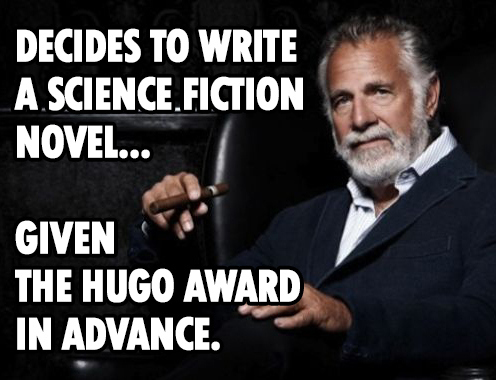Steven Lyle Jordan's Blog, page 26
August 18, 2015
Wait… who’s corrupt now?
Michael Kozlowski, the Editor in Chief of Good e-Reader, recently posted an op-ed on his site titled Self-Publishing is Completely Corrupt. The title, of course, says it all: He tells all aspiring writers yearning to get into the business that the only way to do it is to go through a professional publisher, because all independent and self-publishers are hopeless shills pushing crap products onto the unsuspecting masses. He paints trade publishing as the only credible way to publish, pointing to the awards and accolades available through their system.
In response to his op-ed, I’d like to start by showing you two things:
Okay, now let’s discuss.
Trade publishing, traditional publishing, professional publishing, whatever you want to call it, is a business. It has been from the very beginning, when the first publishing house was formed, and it remains so today. And as a business, it has one and only one purpose: To make a profit. They make that profit off of someone else’s work. Usually writers (but clearly not always). Usually lots of them… as many as they can handle. Because the more writers, the more books sold… the more profit.
Now, you can dress that up any way you want… but it all comes down to the almighty dollar, just like it does in every other business.
Kozlowski’s op-ed states outright that any aspiring writer’s only real choice is to go through the traditional publishing system. I guess he’d like to suggest that all good books will eventually be picked up by a publisher, and then you’re on the way to Easy Street. Now I can’t tell you how many books Kozlowski has written and sent to a traditional publisher, never to arise again from their slush pile… or, for that matter, how many publishers have told him when he submitted a book prospectus: “Sorry, we’re not accepting any submissions… go fish.”
I could tell you how often both of those have happened to me.
Publishers aren’t almighty gods with the omniscient ability to divine the good books buried under a three-story-tall slush pile. In fact, they only even look at that slush pile when they’re desperate for content. So there is quite literally no reason to expect success from sending anything, good or bad, to a traditional publisher. As many people besides me have pointed out, you’d probably have better odds (and a damn sight less work and more fun) playing Powerball than trying to make it in the door at a traditional publisher’s house.
Publishers are more likely to make money by going after someone who’s already proven bankability… the two books above being excellent examples. Already famous? Consider yourself first in line. Kim Kardashian, a girl who made her fame by starring in a (independently-produced) porn video and later mugging for the TV world along with the rest of her family, was given a publishing contract for a book full of pictures. Of her. Taken by her with cheap cellphone cameras. E.L. James (who is actually lauded by Kozlowski as a successful author other independents try to emulate) wrote cheap (and badly-executed) Twilight fanfic that no publisher cared about… until it was rewritten as cheap (and badly-executed) non-Twilight soft porn that sold like gangbusters. And then publishers lined the block begging to be James’ publisher. Trad publishers have shown a remarkable ability to shun a work, until it was produced independently and turned out to be popular as hell… at which time, the publishers would step in with an offer to make the author even more money (and pocket a significant profit themselves).
Because money.
Kozlowski also makes the case that only traditional publishers provide quality products that independents are incapable of creating. He apparently forgets that many people (like, say, me) have actually read independent authors’ works. What’s more, we’ve compared them to traditional publishers’ works—especially over the last decade that ebooks have been developing—and I can tell you, traditional publishers have been responsible for some of the most egregious quality errors I have ever seen in books. We’ll be clear: Trad publishers aren’t perfect in print either. Yes, they generally employ many, many people to catch any errors before they go out. Which makes it even worse when books are produced with errors anyway. Traditional publishers’ products are not perfect… and as time and technology has improved, so have the products of independent authors, today easily rivaling (and often surpassing) the quality of traditionally-published fare.
One aspect of trad publishers Kozlowski discusses may have some merit: He mentions that trad publishers teach writers how to become public figures, to show themselves at functions, make pitches, answer questions and in general make the best impression of themselves to prospective buyers. Sounds legit. Of course, the functions of which he speaks are generally set up by the publishers expressly for the writers… they are PR events, and authors are taught how to walk their walk and talk their talk in order to make their published books look good. Kozlowski contrasts these with independent authors who “shill” themselves through social media, using the technology of the day to promote themselves in new ways. (Kinda like Good E-Reader puts out email newsletters and uses online forums to push its agenda. And its paid advertisers. #PotCallingTheKettleBlack )
He also stresses that traditional publishing is the only way authors can get awards and acclaim, which are shut off from independent authors. Of course they are… by deliberate design. Traditional publishers created those awards, specifically to show off their products… in order to garner interest in other of their products, generate sales, attract other money-making authors to their stables, and make a profit. Traditional publishers pay for the advertisements and press that get authors the worldwide acclaim that generates international sales. Traditional publishers actively encourage their writers to write glowing reviews to stick on the backs of other authors’ books, to impress the press and impressionable buyers. And they deliberately shut out smaller publishing houses and independents by making sure the entry fee into those services, awards and worldwide promotion are too high for smaller houses and indies to afford. They make sure most people hear about their products—not the products by the little guys—to maximize their profit.
Because moolah.
As I read this op-ed, I found myself laughing out-loud at most of its assertions. Nothing Kozlowski claimed could convince me that traditional or trade publishers are anything more than the highly-organized, rich and connected shills that he compares to poor, unconnected, independent shills like me. They do not have a monopoly on content or quality, and the efforts they make to claim the high ground are transparent in their manipulations and machinations. In short: They gamed the system, so they can blow their own horns about how superior they are.
But maybe I’m reading this wrong. After all, Kozlowski himself used the name E.L. James in the same sentence as the words “successful writers.” “Writer” being used because he does not consider James an author. “Successful” because he recognizes the only value to James’ work is its bankability, as opposed to its quality.
So maybe this is a joke on me. Kozlowski actually knows that there’s nothing wrong with going the independent author route, just as he knows that there’s nothing particularly superior about trade publishers and their supposed value to the writers of the world. He knows it all comes down to money, and the trad publishers just have a lot more of it than the rest of us plebes. I’ve just wasted a lot of electrons rebutting a sarcastic op-ed designed to shame those clever, clever publishers into cleaning up their acts; and advising authors not to be suckered by their antics, but to be willing to try something new. He knows who’s really on the corrupt side of the coin here.
Don’t I feel silly.


August 17, 2015
The Most Interesting Science Fiction Writer In The World
August 14, 2015
Oh, fer cryin’ out loud… how do you keep screwing this up?!?
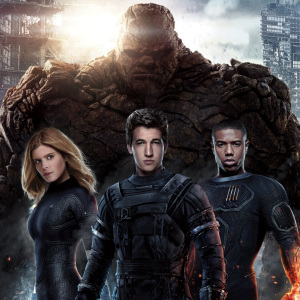 Well, Hollywood has treated us once again to a movie about the Fantastic Four. And once again, it has bombed. And I mean bombed. Hiroshima-level bombed. In a time when superhero movies are almost impervious to box-office failure—when special effects can give us realistic-looking monsters, other-worldly cities of the gods and flying aircraft carriers—when even obscure characters like Ant-Man and the Guardians of the Galaxy can print box-office tickets at will—the FF drop like a lead balloon dumped down one of the Mole Man’s subterranean tunnels.
Well, Hollywood has treated us once again to a movie about the Fantastic Four. And once again, it has bombed. And I mean bombed. Hiroshima-level bombed. In a time when superhero movies are almost impervious to box-office failure—when special effects can give us realistic-looking monsters, other-worldly cities of the gods and flying aircraft carriers—when even obscure characters like Ant-Man and the Guardians of the Galaxy can print box-office tickets at will—the FF drop like a lead balloon dumped down one of the Mole Man’s subterranean tunnels.
And my mind has just rolled out through my ear canal and flopped onto the desk. (Actually, I bet Reed Richards could do that.) Because I simply can’t comprehend how anyone could manage to ruin this idea. Multiple times. As if no one in the movie industry has the vaguest clue as to what they have here.
And I keep saying: Oh, fer cryin’ out loud… how do you keep screwing this up?!?
Then I figure it out.
Now, let’s be clear right out of the box: This isn’t about the cast being too young (though, yeah, I would’ve liked to see four people who seriously look like they may have graduated from college, not Dawson’s Creek… but that’s me). This isn’t about Johnny being Black; interracial adoption is nothing new or radical (though it is admittedly rare that a Black American family would adopt a blond White girl, it’s not like it’s impossible). And it isn’t about the altered use of the Ultimates version of the Four’s origin (interdimensional experiments); I actually like that much better than the 1960s origin (flying a space ship through cosmic rays), which is dated as hell. No; the problems here are much more fundamental than that.
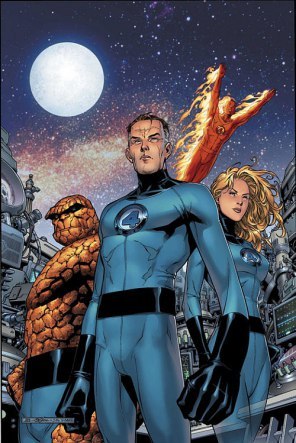 The Fantastic Four may be one of the greatest superhero teams ever created by any comic book company, TV or movie studio. Period. In a grand total of four characters, you have an incredible combination of abilities, more-or-less encompassing the four elements—fire, air, earth and water—in a unique combination of personalities that work together because they are a family. They are brave, optimistic, and smart: They know how to think their way through adversity; but they are also a fighting team, and can dust it up with the best of them when needed.
The Fantastic Four may be one of the greatest superhero teams ever created by any comic book company, TV or movie studio. Period. In a grand total of four characters, you have an incredible combination of abilities, more-or-less encompassing the four elements—fire, air, earth and water—in a unique combination of personalities that work together because they are a family. They are brave, optimistic, and smart: They know how to think their way through adversity; but they are also a fighting team, and can dust it up with the best of them when needed.
Most importantly: These are science heroes, not the muscle-bound demi-gods of most comic books. Following in the footsteps of the legendary heroes of the Science Age, The FF embody the command of human intellect over nature (represented by their powers). They are explorers, and they use science as their tools (and often to defeat their foes). The Fantastic Four have gone into space! They’ve gone into alternate dimensions! They’ve dealt with aliens, fought creatures from the bowels of the Earth and traveled in time!
Science heroes, dude!
But there’s the catch: Studios—like, apparently, most of the United States—are afraid of science. In a world where science rules our lives and provides the technology which allows people to carry on conversations across hemispheres, take selfies from orbit, buy anything online, drive to work and make a living showing moving pictures to the masses… movie studios see “science” as being defined by radioactive monsters, atomic war, killer robots, malicious AI and hackers stealing our credit cards. Talk to them about self-driving cars, and they immediately assume those cars will drive us all off of cliffs either to avoid a few baby ducks crossing the road or just out of spite (and then ponder how they can make a horror movie out of that). Interstellar was released, and fans still fight over how realistic the science was. Studios, following the example of fans, see science as a threat and a downer.
And so they tried to depict the FF as four kids whose lives were ruined by a scary science experiment.
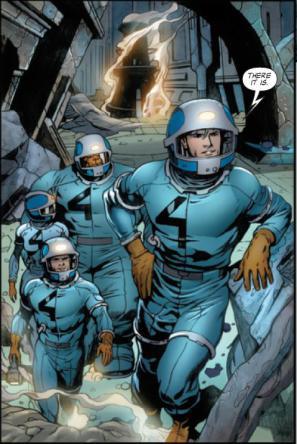 There are reports that the studios who produced the latest FF movie fought with director Josh Trank, forcing it into the “dark, gritty” mold that The Dark Knight trilogy and Man of Steel captured (to significantly mixed success). That was so, so wrong. This is the Fantastic Four… not the F***ed-Up Four. With few exceptions, Marvel movie characters—and especially these characters—are about a bright, modern, World’s Fair world. If you’re not prepared to make a movie that celebrates science and its capabilities… if you’re not prepared to film optimistic and dedicated people who want to use science to explore the brave new world… you have no business filming the Fantastic Four.
There are reports that the studios who produced the latest FF movie fought with director Josh Trank, forcing it into the “dark, gritty” mold that The Dark Knight trilogy and Man of Steel captured (to significantly mixed success). That was so, so wrong. This is the Fantastic Four… not the F***ed-Up Four. With few exceptions, Marvel movie characters—and especially these characters—are about a bright, modern, World’s Fair world. If you’re not prepared to make a movie that celebrates science and its capabilities… if you’re not prepared to film optimistic and dedicated people who want to use science to explore the brave new world… you have no business filming the Fantastic Four.
And hey, there’s still some grit to be had, even under all of that optimism: Reed’s poor social skills, Johnny’s recklessness, Sue’s personal insecurities and Ben’s loathing of his ugly form make for a group that can descend into a full-blown dysfunctional mess. (You know… like any normal family.) And they even come with an arch-nemesis in Victor Von Doom, another genius who’s also enough of an asshole to create a screwed-up experiment, ignore Reed’s warnings about the setup, get caught in and disfigured by the inevitable accident that followed, and egotistically blame Reed for it. So, plenty of room for personal drama and antagonism.
And their stomping ground isn’t just New York or some other podunk town. It’s the interior of the Earth. It’s the Moon. It’s the Negative Zone. It’s the Cosmos. Their inventions have made them rich and famous. Their uniforms are encounter suits. They get around in a flying car and a VTOL rocket. They have single-handedly stopped alien invasions and the destruction of the planet.
Science heroes, dude.
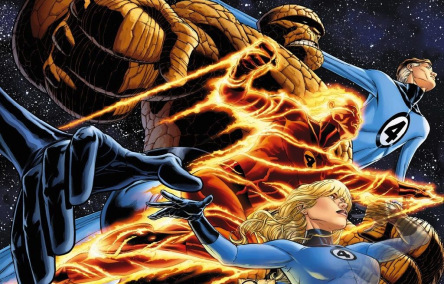 Don’t think it would play? Actually, it could be a slam-dunk. Consider that the Iron Man movies captured the proper pro-science theme well; Tony Stark was nothing if not an optimist engineer, using technology to solve the world’s problems. In fact, both Avengers movies were based on sci-fi-heavy stories (attacking aliens and runaway robots) that the FF could have fit into marvelously. You’d just need to take it up a notch or twelve, combining the brightness of Iron Man with the cosmic backdrop of Guardians of the Galaxy or Star Trek. And use those distinct personalities: Make sure they’re acting, not just reacting.
Don’t think it would play? Actually, it could be a slam-dunk. Consider that the Iron Man movies captured the proper pro-science theme well; Tony Stark was nothing if not an optimist engineer, using technology to solve the world’s problems. In fact, both Avengers movies were based on sci-fi-heavy stories (attacking aliens and runaway robots) that the FF could have fit into marvelously. You’d just need to take it up a notch or twelve, combining the brightness of Iron Man with the cosmic backdrop of Guardians of the Galaxy or Star Trek. And use those distinct personalities: Make sure they’re acting, not just reacting.
And if you want another example of a show that is science-based and optimistic—even when that science is mostly preposterous—look no further than Doctor Who, one of the most popular sci-fi characters in history. The FF operate on a similar level with the Doctor, dealing with science-based problems and threats; plus they bring cool super-powers to the table when needed. Pattern a movie after a Doctor Who-type premise and story, and you’d have a hard time going wrong.
For the record, the 2005 and 2007 Fantastic Four movies were much closer to what the characters should be, as well as the pro-science bias of the movies… especially in the second movie, communicating with and repelling an alien attacker. Their biggest problems were that the storylines left a lot to be desired… and turning Von Doom into a smarmy billionaire businessman effectively derailed the rivalry between him and Reed, and the effectiveness of Doom as an antagonist. But they were much closer than the 2015 movie, in look as well as feel of what the FF should be. A superior set of scripts would have been all those earlier movies really needed to have made them the breakthrough superhero movies that Iron Man eventually became.
So, that’s my take. Thanks to what we’ve just been inflicted with, it will probably be quite some time before anyone tries to do anything with the Fantastic Four again. But when they do… they’d better remember what they’re dealing with and do it right. It’s called science, bee-yatches. Science.
Or they can just go option a Dawson’s Creek reboot and go nuts.


August 10, 2015
Transhumanism? Or just humans?
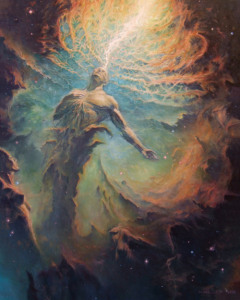 Andrew Smith posted in February an article about Transhumanism that I just came across. And I think that it basically sums up the issues I have with the idea of transhumanism… right down to the name.
Andrew Smith posted in February an article about Transhumanism that I just came across. And I think that it basically sums up the issues I have with the idea of transhumanism… right down to the name.
Andrew points out that the basic premise of transhumanism is that humans will eventually create such incredible technology that we will literally merge with it and, as futurist Ray Kurzweil put it, “transcend biology”… thus bringing about the “Singularity,” the instant when we… who knows, become One with the cosmos or something.
There’s a lot of vagueness here, and for good reason: No one knows what would happen if we somehow evolved to another level of existence. But as Andrew points out, much of these speculations are missing one key factor: The essential nature of humans.
Humans are the planet’s premier tool-using species. Most terrestrial species have managed to develop forms of communication, and many of them have gone on to develop more sophisticated languages. Some of them have learned how to pass on their knowledge to their peers and offspring using language. A few of them have figured out how to use rudimentary tools to make their lives easier. But Humanity has developed both tools and language to a high art, by combining the two in order to continue to build on both; he has taken it to a level unmatched by any other living thing on this planet.
The primary definition of transhumanism is the transcendence of biology; but humans have been transcending biology for the last million years, ever since they learned to tame fire and started wrapping skins around their bodies to protect them. Every use we make of technology, to do something that the unaided human body is incapable of, is transcending biology. The glasses on your nose are transcending your biology. You might even make the case that advanced communication, in being able to impart theories and higher concepts impossible to physically touch or see or even prove, is almost a form of telepathy (using complex sounds to pass knowledge from mind to mind), and therefore transcending biology.
Is there a difference, then, in what we are doing now and what we’ve done in the past? As Andrew cites, only that our ability to impact our environment beyond our biological capabilities has increased in pace so significantly that we can see in our lifetimes the changes happening to us and around us. And Andrew claims that that isn’t enough of a reason to claim what we’re doing is anything new or different:
“Our use of technology is exactly what makes us human. We are able to grasp objects because of our opposable thumbs, and a million years ago or so we started tinkering with things, ultimately making improvements to these things- and, more importantly, showing others how to make these improvements so that future generations didn’t have to figure the same thing out. Standing on the shoulders of our ancestors, we no longer have to figure out how to control fire, or how to have running water in our houses, or how to search for things on the internet in a matter of seconds.”
(Personally, I contend that a major reason for that accelerated pace is simply the incredible proliferation of humans on this planet: When you go from a few hundred thousand to seven billion in the space of a few thousand years, there’s a lot more people around to keep developing those tools and ideas, and progress can’t help but be sped up.)
Humans are now what they always have been. Our technology has been part of us, literally draped over our shoulders and painted on our faces, for millennia. And if, in the future, we figure out how to implant electronics into our frontal lobes and process thoughts a million times faster than we can today… we’ll still be human, using our tools to make our lives better. There’s nothing transcendent about that; that’s just us being us. As long as humans are in the equation, they will be doing what humans do.
Which leaves us with one thing to consider: What about the moment when humans, possibly aided by our incredible technology, manage to somehow leave our physical bodies completely behind and become One with the cosmos? Whether you believe that will happen or not… if it does, it so happens that there’s already a name for that: Evolution. True, intentionally developing into a non-corporeal state of being wouldn’t by definition be Darwinian Evolution; so I suppose that might be known as Transcendental Evolution.
But until and unless we reach that moment, my opinion is that transhumanism means, specifically, nothing. We are humans being humans, as we have been doing for a million years, and will probably be doing for a million more… until we evolve into something else. And at that point, we won’t consider it to be transhuman, any more than we consider our present state to be transprimate.


August 9, 2015
New short: Sky Driver
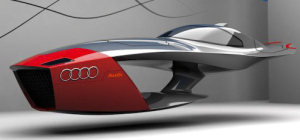 I’ve posted a new short story on the future of flying cars, and a man who wants to be able to self-pilot his car.
I’ve posted a new short story on the future of flying cars, and a man who wants to be able to self-pilot his car.


August 6, 2015
Is the Universe fake? Prove it.
It’s a theory that seemingly won’t die: The idea that the universe we know is not real, but in fact some kind of Matrix-like simulated environment in which we exist solely as programs, acting out some user’s will and awaiting the moment when someone decides to switch it all off. Some fascinating movies have been made on the subject (like The Thirteenth Floor, above, to my mind a more interesting and deeper movie than The Matrix) and Tron.
It’s a lovely intellectual/philosophical exercise. But that’s all it is. And until someone provides some fresh meat to this theory, I refuse to even entertain the notion.
What do I mean by “fresh meat”? Simply put, a way to demonstrate that the universe we know is a simulation and not a “real” environment. We need an unimpeachable experiment that will provide evidence, one way or the other, of the reality of reality.
What we need is a physics experiment that will only work if physics is not real.
Obviously, that sounds weird… but it’s exactly what has to happen. Scientists know that there are certain aspects of this world which can only work/exist if physics works the way we know it to work. Conversely, there are things that can never work in a world governed by physics, but could be made to work in a simulated environment. This understanding is necessary to prove the existence (or non-existence) of reality.
Using this logic, someone has to devise a “reality experiment” with an Outcome, A, that would only work if the physics we think governs us are, in fact, simulated… faked… not real. In other words, physics would tell us that Outcome A was (literally) physically impossible, and when tested, it would prove to not work. Outcome A must be an outcome that can only happen if we are, in fact, in a simulation; there is no real-world way to spoof the outcome, nor does physics suggest that we could, even with the absolute resources required to do so.
As a bonus, if a second experiment had an Outcome B that always worked in the real environment but absolutely could not be faked in a simulated environment—in other words, in no simulated environment could Outcome B ever be made to happen—you could compare outcomes for a double-proof. If Outcome A works and B does not work—the universe is simulated. If Outcome B works and A does not work—the universe is real.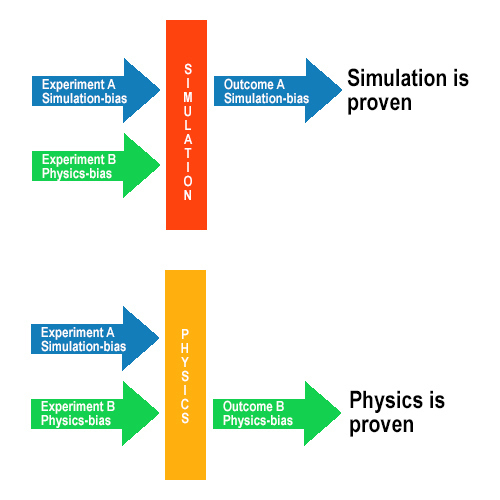
And if neither A nor B works—or if they both work—the universe is either more complex or much weirder than we can possibly imagine.
Either way, I’m going to wait patiently for someone to devise the experiments and run them. And until they do, you can stop bothering me about this whole “universe is fake” stuff.


July 31, 2015
Must-see SF TV: Humans
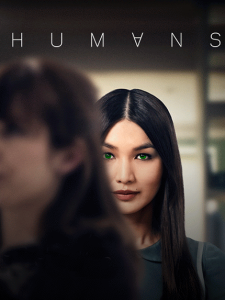 Humans is a British remake of a Swedish TV show, Real Humans, about a world like our own, except that human-looking “synths” work for us, drive us around, babysit and occasionally have sex with us. But in this world—here’s the inevitable hook—someone has secretly created synths with consciousness, and while authorities search for them, fearful of what they might do, they hide among us, fearful of what we might do.
Humans is a British remake of a Swedish TV show, Real Humans, about a world like our own, except that human-looking “synths” work for us, drive us around, babysit and occasionally have sex with us. But in this world—here’s the inevitable hook—someone has secretly created synths with consciousness, and while authorities search for them, fearful of what they might do, they hide among us, fearful of what we might do.
At this time of year, Humans is the only point of light in an otherwise dim TV season (and I say that, knowing fully about Syfy’s present TV lineup… le yawn. Le sigh.). One thing I generally say about British television in general, and most of their science fiction in particular, is that they have a more polished production and actors than almost all American TV and SF. Humans‘ cast is great to watch, strong and believable, and nothing feels staged, manufactured or concocted out of a special effects department.
I have to admit that the premise is staid, even painfully predictable: Robots are slaves, conscious robots are fugitives, authorities are after them… the robots are afraid of being destroyed, the possible results of their being free scare the humans… yadda yadda. But then it (thankfully) gets interesting: Two of the conscious synths were separated from the group; one was recaptured by the authorities; and the other—Anita—has apparently lost its consciousness, and is installed as a servant in a typically-mildly-dysfunctional household. But the family has noticed Anita doesn’t act… exactly… like other synths. The family’s daughter secretly hacks into Anita, and suddenly Anita makes a frightened plea for help… before reverting back into her un-conscious self. Someone’s trapped in that subservient body… someone who is in love with David, another of the synths, who wants her back desperately… will she get out? Will she and David (and the other conscious synths) be reunited? And what then?
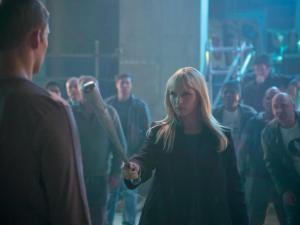 So, they’ve found some interesting directions to go into, without so far revealing the end game (exactly what happens if the synths reunite?). And they’ve thrown us a few curves, such as the synth hidden in the police force… the scientist who wants to keep his aging synth around to preserve its memories of his late wife… and Niska, the conscious synth female who seems to be building a distinct hatred for humans and a talent for violence. But the big mystery, and the reason to watch, is undoubtedly Anita. Not only did they find a beautiful and talented actress in Gemma Chan, capable of pulling off the stiff and slightly creepy Anita in the midst of this problem household; but the tantalizing hints to her buried consciousness (known as Mia) make the audience even more aware that there’s a person locked in there, just behind those green eyes, desperate to get out. I, for one, focus with laser-precision at every moment that seems to be a potential moment of liberation, or at least a measure of self-recognition, for her. And if/when Mia finally makes it to the surface and stays there, I fully expect to cheer and toast her.
So, they’ve found some interesting directions to go into, without so far revealing the end game (exactly what happens if the synths reunite?). And they’ve thrown us a few curves, such as the synth hidden in the police force… the scientist who wants to keep his aging synth around to preserve its memories of his late wife… and Niska, the conscious synth female who seems to be building a distinct hatred for humans and a talent for violence. But the big mystery, and the reason to watch, is undoubtedly Anita. Not only did they find a beautiful and talented actress in Gemma Chan, capable of pulling off the stiff and slightly creepy Anita in the midst of this problem household; but the tantalizing hints to her buried consciousness (known as Mia) make the audience even more aware that there’s a person locked in there, just behind those green eyes, desperate to get out. I, for one, focus with laser-precision at every moment that seems to be a potential moment of liberation, or at least a measure of self-recognition, for her. And if/when Mia finally makes it to the surface and stays there, I fully expect to cheer and toast her.
There aren’t many SF shows that I consider must-watch TV. They tend to be predictable, plodding experiments into how many sci-fi tropes and clichés you can stuff into a show and not freak out the TV execs too much. Most shows with human-looking robots tend to be far too predictable and pedantic to hold my interest… Almost Human being the most recent example of such a show, and one that lost me partway through the second episode. But I’m holding out hope that Humans continues to break the boundaries of the typical “dawning of robot consciousness” and “free the slaves” tropes, and takes us into some interesting directions.


July 30, 2015
Happy birthday to an American icon
 This week marked the 75th anniversary of the appearance of Bugs Bunny, the most famous of the Looney Tunes/Merrie Melodies stable of characters. Having grown up watching bugs on television (not quite old enough to have seen him in theaters before the featured movies), I have nothing but fond memories of the “waskally wabbit” and his charmed life (surely that rabbit’s foot gave him plenty of luck). But it amazes me sometimes that others—my wife included—don’t get what makes him so special, so revered and so memorable… in short, what has made him a bona-fide American icon recognized and loved around the world.
This week marked the 75th anniversary of the appearance of Bugs Bunny, the most famous of the Looney Tunes/Merrie Melodies stable of characters. Having grown up watching bugs on television (not quite old enough to have seen him in theaters before the featured movies), I have nothing but fond memories of the “waskally wabbit” and his charmed life (surely that rabbit’s foot gave him plenty of luck). But it amazes me sometimes that others—my wife included—don’t get what makes him so special, so revered and so memorable… in short, what has made him a bona-fide American icon recognized and loved around the world.
So take a load off and I’ll ‘splain everything, doc.
When Bugs was created by Leon Schlesinger Productions (later Warner Bros. Cartoons) in 1938, the character was originally used to make life miserable for a hunter (Porky Pig) trying to shoot him. His demeanor would sometimes get a bit more aggressive in his efforts to torment hunters and other characters, but it eventually settled into a more playful, less intentionally violent character that epitomized Bugs. Chuck Jones, upon taking over the Warner’s animation studios, locked down his personality for all time afterward.
Bugs Bunny represented, in his many incarnations, the American “little guy”… one of the downtrodden, huddled masses, yearning to be free. He never had much, but he was glad of what little he had… and held on to it tenaciously. And though he didn’t have the equivalent of a college degree, Bugs had a quick wit, street-smarts and plenty of natural intelligence. He could get along with anyone, and held no prejudices or malice towards any group. He was the kind of guy who could naturally get ahead, if he just got the right breaks… but honestly wouldn’t be too concerned if he never got them.
This was the good-natured character that was always pitted against those who callously sought to do him harm, whether it was a traditional hunter (like Elmer Fudd) hoping to bag him for dinner… a construction worker intent on building a skyscraper on top of his home… or a crazed soldier denying him access to the succulent carrots being grown south of the Mason-Dixon line. And Bugs didn’t seek to kill his opponents, as they so often tried to do with him: He was satisfied with their surrender; and often arranged things so they didn’t know they had lost at all… or didn’t care in the end.
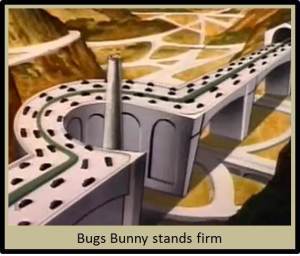 Like early 20th century America, Bugs never looked for a fight; but when he was drawn into them, he didn’t back down. And against his opponents’ superior strength, numbers or firepower, Bugs would use only his wits, trying to trick, cajole or otherwise bamboozle his opponent into giving up the fight and letting him go his own way. And when he won, he didn’t gloat or celebrate… though he’d give a knowing wink to the audience and an acknowledgement that he was always the smartest of all, the deserving winner of every bloodless coup.
Like early 20th century America, Bugs never looked for a fight; but when he was drawn into them, he didn’t back down. And against his opponents’ superior strength, numbers or firepower, Bugs would use only his wits, trying to trick, cajole or otherwise bamboozle his opponent into giving up the fight and letting him go his own way. And when he won, he didn’t gloat or celebrate… though he’d give a knowing wink to the audience and an acknowledgement that he was always the smartest of all, the deserving winner of every bloodless coup.
(And only once was Bugs’ shoe put on the other foot… early in his career, when wartime cartoons introduced America to the “Gremlin,” the mysterious force that seemed to damage machines at just the wrong time. Bugs’ struggles with “the Gremlin from the Kremlin” represented a one-time turnabout for Bugs: For once he was the hapless aggressor who could not catch or stop his tiny tormenter.)
Bugs always represented the likable Average Joe, just looking to make a modest living like any good American. And his ability to think his way out of a jam (instead of being the bully and beating opponents into submission). He remains the icon of perseverance, cleverness, wit, grace under pressure, (mostly) non-violent action and an essentially optimistic outlook on life that has been admired by people in every walk of life… in every culture. Bugs became an American ambassador that resonates with audiences to this day. All of us wishes we had a little (or maybe a lot) of Bugs Bunny in us; his ability to accept the life he’s chosen, to rise above adversity, to turn the other cheek… and to be able to lower the boom on those who truly deserve it.
In a non-lethal, funny way, of course.
Happy birthday, Bugs. May you have 75 more… easy.


July 28, 2015
When it’s time to pack it in
 John Stewart, host of The Daily Show, will be stepping down from the show next week. To the public, he’s cited two main reasons for his decision: One, to spend more time with his family; and two, because the endless cycle of political and social insanity in which he’s immersed himself, every week since 1996—coincidentally, about the same time I started writing—has finally worn him down.
John Stewart, host of The Daily Show, will be stepping down from the show next week. To the public, he’s cited two main reasons for his decision: One, to spend more time with his family; and two, because the endless cycle of political and social insanity in which he’s immersed himself, every week since 1996—coincidentally, about the same time I started writing—has finally worn him down.
As much as I will miss his appearance on the show, I know just how he feels.
John Stewart has been devoted to his trade, monitoring and studying the goings-on of the political and social landscape, for a long time. And it’s been clear that, even when he’s made jokes at some politician’s or celebrity’s expense, there has been a measure of pain in him… that he clearly can’t believe the things he has witnessed over the past nineteen years. And though he’s often made light of it, I suspect he’s afraid that too much longer at it will only break his spirit, his belief that this is basically a good world, worthy of a better future.
I often feel the same way, when I witness the goings-on of life in the social, scientific and technological fields: The crazy trends; the unconsidered opinions; the selfish actions; the self-serving rhetoric. And as I frequently see vitriol directed at me—when I try to point out the trends that need changing, the actions that need stopping, the rhetoric that’s self-defeating, and the technology people are afraid of applying—I feel the pain, the frustration of expending energy trying to help people, only to continually bash my head against a brick wall of apathy, resistance and ignorance. Like John Stewart, I worry that I may lose myself in fretting about all the insanity, until there’s nothing of my own sanity to keep me going… until I can’t see my family, my friends, my fortunate circumstances, beyond the lunacy of the rest of the world.
I also feel it in my efforts to sell my books, to get noticed, to make a name for myself. After making what efforts I can, and watching other people get ahead with no better books, but better resources, than I, my level of frustration has reached a point where I can’t think about writing, can’t even read a book, without second-guessing every step of the process, over-examining every word and phrase, wondering if there is some way I could still achieve what this or that author has. The joy of reading a fun book is draining out of me, to the extent that if I have a choice… I’d rather just take a nap.
(I’m catching up on a lot of sleep.)
Fortunately for John, he’s made a name for himself… so he can move on and find any number of other things he can do, and plenty of people to support him. In that way, I am certainly not like John Stewart. In the twenty years that I’ve been writing and promoting science and science fiction, I have achieved none of that success; so if I gave it up tomorrow, I’d have no legion of followers, no emotional well-wishers, no dedicated supporters, no purse-strings handed to me to finance my next project. I would just be… done.
I’ve been looking for the light at the end of the tunnel for quite some time. There’s been this tiny pinprick in there, from the beginning; but it’s been so long that it hasn’t moved, hasn’t brightened, hasn’t grown, that it’s beginning to look like it’s just Wile E. Coyote shining a laser pointer down the tunnel, waiting for me to expend all my energy chasing a light that will never resolve into anything, so he can devour me when I collapse, exhausted and defeated, alone in the dark.
In fact, I’ve already stopped my forward momentum: I just can’t bring myself to chase that light any more; not unless someone can prove to me that it’s more than a laser pointer mocking me from a distance. I’m standing at the mouth of the tunnel, and I can’t will myself to go in.
I wish I could say I have a kindred spirit in John Stewart; but I can’t say that in any honesty. True, he had resources behind him that I don’t… but he jumped full in, he bolted down that tunnel, chasing the light. Mine was a half-hearted jog; and when the going got tough, I pulled up short. I may empathize with John Stewart, but I am not like him. I never had his support… nor his confidence. I don’t have it now.
Maybe, as John’s role as The Daily Show host fades into the sunset, I’ll allow myself to fade into the same shadows. Maybe, like John, I’ll take this as a sign to find something new to do with my life… perhaps something in which I can apply more confidence, get more support, and have a better chance at success.
Maybe this is the excuse I need to lose weight. No one else will particularly care… but my doctor will lighten up on me a bit. That’s gotta count for something.


July 23, 2015
Verified, not trusted programming

Photo © Whitney Curtis for WIRED.com
Today’s news is highlighting an issue revealed about today’s highly-computerized automobiles: That some of them can be hacked from the outside, and some functions can be disabled. The Wired article demonstrated this on a Jeep.
Though I hadn’t touched the dashboard, the vents in the Jeep Cherokee started blasting cold air at the maximum setting, chilling the sweat on my back through the in-seat climate control system. Next the radio switched to the local hip hop station and began blaring Skee-lo at full volume. I spun the control knob left and hit the power button, to no avail. Then the windshield wipers turned on, and wiper fluid blurred the glass.
As I tried to cope with all this, a picture of the two hackers performing these stunts appeared on the car’s digital display: Charlie Miller and Chris Valasek, wearing their trademark track suits.
This comes at a particularly significant moment, when car and truck manufacturers are working on fully-autonomous vehicles that could one day dominate our roads, and American drivers are facing the potential world in which they have no manual control over the actions of their cars.
And it’s just another example of one of the greatest dangers of our time: That electronics and computers are far too vulnerable to malicious actions than they ought to be, and our day-to-day safety is at risk because of it.
 Not only are there few vital and non-vital systems in this world that have some semblance of electronic control applied to them, there are virtually none that aren’t capable of being hacked into by a determined-enough—or even by a casual—attacker. In fact, it’s become one of the most familiar tropes of today’s society, the good or bad hacker that manages to access systems, computers and programs and change them for good or ill. As more and more automation is being applied around us, new reports of malicious hacking come in every day, and people are afraid of their personal data being compromised… or financial accounts being drained… or communications systems eavesdropping on personal messages and compromising their privacy… and of their plains, trains or automobiles being directed to crash.
Not only are there few vital and non-vital systems in this world that have some semblance of electronic control applied to them, there are virtually none that aren’t capable of being hacked into by a determined-enough—or even by a casual—attacker. In fact, it’s become one of the most familiar tropes of today’s society, the good or bad hacker that manages to access systems, computers and programs and change them for good or ill. As more and more automation is being applied around us, new reports of malicious hacking come in every day, and people are afraid of their personal data being compromised… or financial accounts being drained… or communications systems eavesdropping on personal messages and compromising their privacy… and of their plains, trains or automobiles being directed to crash.
This threat is because of a fundamental flaw in our electronics and programming systems: That their base design was built by scientists and programmers who worked together in good faith, and expected other scientists and programmers to share their good intentions. The thought behind this was to allow one person to be able to review and improve the core design created by another person, and therefore to improve the system. This architecture of trust is the very foundation of our computers and electronics, the core on which everything is built.
But as electronics, computers and programming have evolved, they have given easy access to people outside of the scientific and programming professions, who have their own agendas and no interest in others’ good intentions. The same attributes that made computers and programs so attractive also proved to make them vulnerable to unwanted manipulation… and because those attributes go so deep into the system, it’s proven almost impossible to prevent hacking and attack. And as we rapidly approach a world in which computers control more and more of our society, and may soon exhibit a high intelligence of their own, this is a threat we can ill-afford.
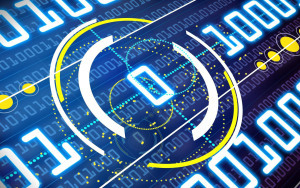 Our computers and programs need to undergo a complete redesign, from the bottom-up, hardware and software, around new paradigms: Verified, not Trusted; and Common Sense. Systems that can presently accept input from any source need to have sound firewalls that not only block unintended access, but put all input through a severe vetting to make sure it is from a proper source… and especially if it is from an unexpected or unique source. Encryption must be the rule, not the exception, and must be involved in every step of a decision or input process.
Our computers and programs need to undergo a complete redesign, from the bottom-up, hardware and software, around new paradigms: Verified, not Trusted; and Common Sense. Systems that can presently accept input from any source need to have sound firewalls that not only block unintended access, but put all input through a severe vetting to make sure it is from a proper source… and especially if it is from an unexpected or unique source. Encryption must be the rule, not the exception, and must be involved in every step of a decision or input process.
Possibly most important is to give common sense to programming. Vital programs need to have an innate awareness of the inputs they receive, to compare to the inputs they expect to get, and fully understand the ramifications of acting upon them, before they are executed; and must have the ability to ignore and even countermand inputs that they recognize to be bogus or dangerous. Backup systems should provide real-time data so that programs can evaluate a set of inputs and orders against its surroundings, and make a determination of whether that input or order may pose a risk or contradict its understood function.
Programming like this would have prevented the hack of the Jeep as described in Wired. The vehicle, when presented with outside inputs to change radio settings, operate wipers, etc, would have been smart enough to ignore them, as it would have the common sense to know that no outside input should need to operate such equipment. It might even have the ability to advise the driver: “Someone seems to be trying to change the settings of X, Y and Z. Do you want to okay this?”
 And as the article further describes a moment when the outsiders hacked into the engine operation, essentially killing the vehicle’s engine while in traffic… an intelligent program would have been able to check its surroundings and determine that instructions from any source to alter the operation of the engine while in motion was a fundamentally bad idea. It would then have the option of directing the driver that there was a problem requiring him to pull off the road, activating emergency signals, and even assisting in pulling the car over if the driver did not respond to queries.
And as the article further describes a moment when the outsiders hacked into the engine operation, essentially killing the vehicle’s engine while in traffic… an intelligent program would have been able to check its surroundings and determine that instructions from any source to alter the operation of the engine while in motion was a fundamentally bad idea. It would then have the option of directing the driver that there was a problem requiring him to pull off the road, activating emergency signals, and even assisting in pulling the car over if the driver did not respond to queries.
It’s not enough to add these improvements to existing programs; hardware and software has been designed with too many base-level “back doors” that hackers can exploit, ways to bypass basic security settings and protocols to insert commands. Those back doors cannot exist… they need to be completely removed, and the entire wall reconstructed to leave no trace of its former openings. Everything must go through front doors, with strong security and common sense awareness at each stop and crossroad. Programs must be designed to err on the side of caution, to pause when an instruction doesn’t check all the proper boxes, to double-check against other data, and to reject commands which aren’t right.
The world is becoming more intertwined and interdependent with each passing day; and our computers have become vital tools to the daily and future operations of our world. But with the need to apply the latest in computer systems to fixing the complex ills that task us, there are legitimate concerns and threats that must be addressed. Until we finally do a bottom-up redesign of our electronics and computer hardware and software, we will never accomplish the improvements society needs to survive.





